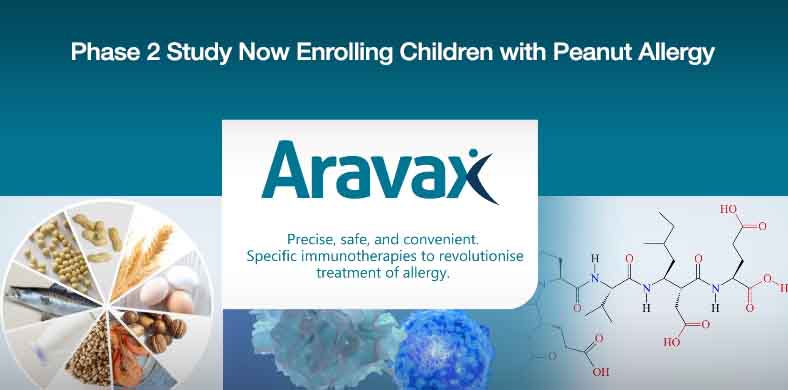A peanut allergy can be severe and life-threatening if not treated promptly. Peanut allergies are one of the most common food allergies in children in the USA, with more than 2% of children being affected. While there is no cure for a peanut allergy, researchers are exploring ways to reduce the risk of severe reactions to peanut for those affected.
PVX108 – A Novel Solution?
Aravax is using its platform technology to develop a new type of treatment for peanut allergy, PVX108.
Unlike some other treatments, which contain whole peanut proteins, PVX108 only contains small, precisely manufactured pieces of these proteins that can be used to retrain the immune system to tolerate peanuts but are too small to trigger allergic reactions. This means PVX108 has potential to avoid the severe allergic reactions that can occur during administration of treatments made with whole peanut proteins.
Available data suggest PVX108 may also help people develop a long-term treatment response, so the study drug may help them even after they stop taking it.
PVX108 offers the following potential advantages over other treatment approaches:
- It is designed to avoid the risk of causing allergic reactions during treatment
- It does not require a dose escalation phase
- It will be delivered monthly (rather than daily)
- It has potential for long-lasting effects
Clinical Studies of PVX108
PVX108 has already been tested in adults with peanut allergy and was shown to be safe and well tolerated. Study results also showed that 6 doses of PVX108 was sufficient to produce clinically relevant changes to peanut-specific immune responses which persisted over 12 months after completion of treatment. Similar immune changes have been associated with efficacy during peanut Oral Immunotherapy (OIT) (including for Aimmune’s Palforzia), but these effects have been shown to diminish as soon as dosing is ceased.
Aravax is currently running a Phase 2 study in Australia and the USA to see if PVX108 can safely reduce peanut allergy in young children and adolescents. Twenty-four adolescents aged 12-17 have already been enrolled into this study in Australia to provide additional information on the safety of PVX108 before enrolment of younger children.
“Following the successful enrolment of 24 adolescents, aged 12-17 years, into the study last year, we are now seeking 66 children aged 4-11 years to participate in the trial” explains Dr Pascal Hickey, CEO, Aravax.
“Aravax is working to bring life-changing benefits to children and their families. The precautions family take to protect peanut-allergic children from the risk of anaphylactic reactions can be highly burdensome, which is why we’re so pleased to be expanding the trial to include younger children”, continued Dr Hickey.
The purpose of the trial is to assess the safety and efficacy of two different dose levels of PVX108 in children with peanut allergy, and to see how long effects may persist. Children will participate in the study for approximately 2.5 years and will need to attend the study clinic on a regular basis – following enrolment subjects will receive medication approximately once a month for two periods of 12 months separated by a six month period off treatment. There will be a placebo arm in the first part of the study, but all participants will receive active (PVX108) treatment during the second part (extension phase) of the study.
Further information about the study can be found here: A Safety and Efficacy Study of PVX108 in Children and Adolescents With Peanut Allergy.
Have questions? Contact Aravax directly via e-mail at info@aravax.com.au.





